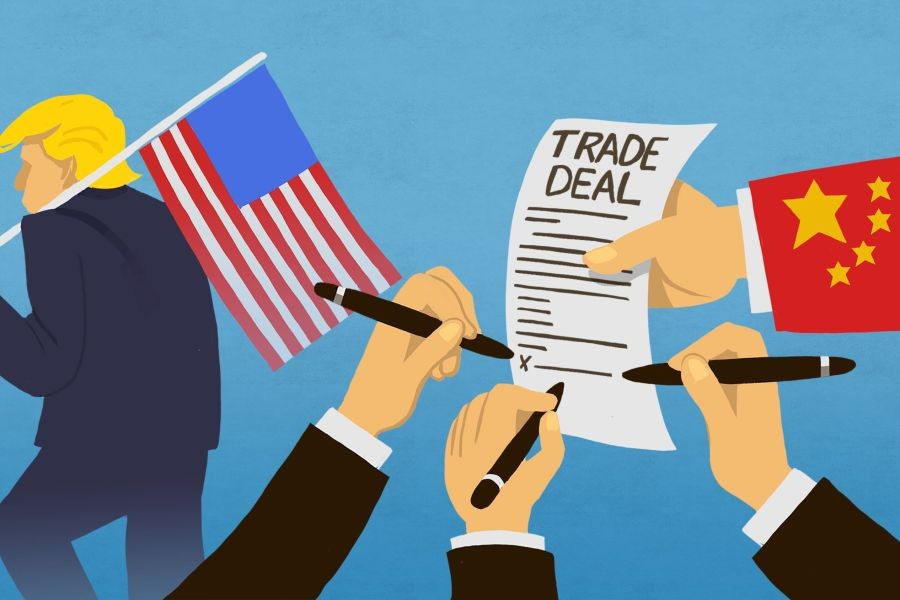Australia's economic landscape is intricately linked to its trade relationships with global superpowers. As a nation rich in resources, yet with a relatively small population, Australia's prosperity hinges on its ability to negotiate favorable trade deals. Understanding the complexities of how Australia navigates these negotiations offers valuable insights into the country's economic strategies and the global economic environment.
The Importance of Trade to Australia's Economy
Trade is a cornerstone of Australia's economy. According to the Australian Bureau of Statistics (ABS), exports of goods and services accounted for approximately 24% of Australia’s GDP in 2022. This reliance underscores the importance of strategic trade partnerships with economic giants such as China, the United States, and the European Union. These relationships are not just about numbers; they are about securing Australia's place in a rapidly shifting global economy.
Case Study: Australia's Trade Relationship with China
Australia's economic relationship with China serves as a prime example of both opportunity and challenge. China is Australia's largest trading partner, with trade between the two nations reaching AUD 235 billion in 2022. However, this partnership is not without its tensions. Recent geopolitical frictions have illustrated the risks of over-reliance on a single market. As a result, Australia has been actively seeking to diversify its trade relationships.
Strategic Negotiations with the United States
The United States represents another crucial partner in Australia's trade strategy. The Australia-United States Free Trade Agreement (AUSFTA), implemented in 2005, has been pivotal in strengthening bilateral trade, which was valued at AUD 80 billion in 2022. The agreement not only facilitates trade but also promotes investment and enhances economic cooperation. As the global economy evolves, maintaining a robust relationship with the U.S. remains a strategic priority for Australia.
Key Strategies in Trade Negotiations
Australia employs several key strategies in negotiating trade deals with superpowers, balancing economic interests with national policy priorities.
- Diversification: Recognizing the risks of dependency, Australia actively pursues diversification of its trade partnerships. This includes strengthening ties with emerging markets in Asia and Africa.
- Regulatory alignment: Ensuring that trade agreements align with Australian regulatory standards, such as those set by the Australian Competition & Consumer Commission (ACCC), is crucial. This helps protect domestic industries while enabling smoother trade flows.
- Value-added exports: Australia is shifting focus from raw materials to value-added products and services. This strategy not only enhances trade value but also stimulates domestic industries and innovation.
Data-Driven Insight: Australia's Trade Diversification Efforts
A report from the Reserve Bank of Australia (RBA) highlights that Australia's trade diversification efforts are beginning to bear fruit, with exports to India and Indonesia growing by 15% and 12% respectively in 2023. These efforts reflect a strategic pivot towards securing more stable and multifaceted economic partnerships.
Challenges and Opportunities in Global Trade Negotiations
Navigating trade negotiations with superpowers presents both challenges and opportunities for Australia.
- Geopolitical Tensions: Political dynamics can impact trade agreements. Australia's diplomatic relations, especially with China, can influence trade negotiations and outcomes.
- Technological Advancements: The rise of digital trade and e-commerce represents a significant opportunity for Australia to expand its services sector globally. However, it also requires adaptive regulatory frameworks to manage data privacy and cybersecurity concerns.
- Environmental Regulations: As global focus shifts towards sustainability, Australia must align its trade strategies with environmental policies. This includes commitments to reduce carbon emissions and promote green technologies.
Case Study: The Comprehensive and Progressive Agreement for Trans-Pacific Partnership (CPTPP)
The CPTPP is a landmark trade agreement that exemplifies Australia's commitment to multilateral trade. Covering 11 countries, this agreement enhances market access for Australian exporters and is projected to boost Australia's GDP by AUD 15 billion by 2030, according to a report by the Treasury AU. The CPTPP illustrates how Australia leverages multilateral platforms to strengthen its trade positions.
Common Myths & Mistakes in Trade Negotiations
- Myth: "Trade agreements only benefit large corporations." Reality: Small and medium enterprises (SMEs) benefit significantly from reduced tariffs and improved market access. The Australian Government provides support to help SMEs navigate and capitalize on new trade opportunities.
- Myth: "Australia is too reliant on resource exports." Reality: While resources are vital, services exports, particularly in education and tourism, are rapidly growing and diversifying Australia's trade portfolio.
Future Trends & Predictions
Looking ahead, Australia's trade strategies will likely be influenced by several key trends:
- Increased focus on Asia-Pacific: As the Asia-Pacific region continues to grow economically, Australia will deepen its engagement with regional trade agreements.
- Technology-driven trade: Digital trade agreements will become increasingly important, with a focus on data flows, cybersecurity, and digital services.
- Sustainability in trade: Environmental considerations will shape future trade agreements, with Australia committing to sustainable practices and green technologies.
Conclusion
Australia's approach to negotiating trade deals with global superpowers is both strategic and dynamic, balancing economic growth with national interests. As Australia continues to navigate the complexities of global trade, its ability to adapt and innovate will be key to securing its economic future. By diversifying trade partners, leveraging technological advancements, and committing to sustainability, Australia positions itself as a resilient and competitive player on the world stage.
People Also Ask
- How do trade agreements benefit Australia's economy? Trade agreements reduce tariffs, enhance market access, and stimulate economic growth by boosting exports, particularly in sectors like agriculture, mining, and services.
- What are the risks of Australia's reliance on China for trade? Over-reliance on China exposes Australia to economic risks due to geopolitical tensions and market fluctuations, emphasizing the need for trade diversification.
- How does technology influence Australia's trade negotiations? Technology facilitates digital trade, enhances supply chain efficiency, and requires adaptive regulatory frameworks to manage data privacy and cybersecurity.
Related Search Queries
- Australia China trade relationship
- Australia US free trade agreement
- Impact of trade agreements on Australian economy
- Australia trade diversification strategy
- Future of trade in Australia

![British Medallion Trench Lighter [1910s] 🔥](https://s3.ap-southeast-2.wasabisys.com/cdn.vidude.com/upload/photos/2026/01/519b1b220c0beed4bd2e114e71ea9027ebc4c4ebaCcvsVn2LNaYTrQvqWih.video_thumb_7422_59.jpeg)































raphaelcostas6
9 months ago